

The Business of Fast Fashion. ‘Fast Fashion’ refers to clothing and accessories that are designed to reflect current industry trends, yet produced using less expensive materials to ensure a low price tag.

For the last two decades, clothing retailers like H&M, Zara, and Forever 21 have popularized Fast Fashion among everyday consumers. However, not everyone is a huge fan of the trend. Many designers, for instance, have complained that Fast Fashion has reduced conceptual originality within the clothing industry in order to produce a higher volume of garments and accessories. Zara, for example, churns out 10,000 new items every year; most boutique designers, by comparison, release between 50 and 100 pieces. Fashion in 2025: plenty of fast fashion, few independent retailers - Fashion. The next twelve years will be a time of major growth for big fashion chains.
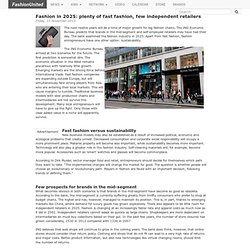
The ING Economic Bureau predicts that brands in the mid-segment and self-employed retailers may have had their day. The bank examined the fashion industry in 2025. Apart from fast fashion, fashion entrepreneurs have one other option: sustainability. The ING Economic Bureau arrived at two scenarios for the future.
Fast fashion versus sustainability New business models may also be established as a result of increased political, economic and ecological problems that create unrest. According to Dirk Mulder, sector manager food and retail, entrepreneurs should decide for themselves which path they want to take. Fast-fashion-slows-down-less-damaging-designs-on-the-high-street-7814472. With a stack-them-high and sell-them-cheap philosophy somewhat entrenched in the British high street – and the attitudes of shoppers thereon – it has been all too easy for retailers to thumb their nose at the concerns of the few.
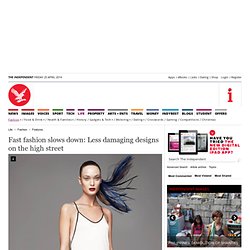
However, awareness of ethical and environmental concerns continues to grow, and momentum builds – so what is a retail giant to do? The response of many has been to source some fair-trade, organic cotton to create a piece or two – hence the proliferation of tote bags of late. Topshop, unarguably the biggest brand on the high street, has reached its size on a reputation for being an early adopter.
Thus, a cotton shopping bag simply would not do. And so the Reclaim to Wear collection was born, a tightly edited capsule of pieces made from reclaimed textiles. "Upcycling tells a story," says de Castro. "The textile industry is facing huge challenges," de Castro explains. Bid to buck 'fast fashion' trend. The government has launched a campaign to tackle the environmental impact of a "fast fashion" culture.
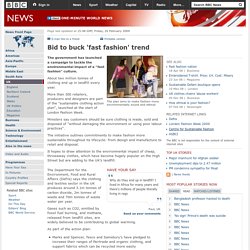
About two million tonnes of clothing end up in landfill every year. More than 300 retailers, producers and designers are part of the "sustainable clothing action plan", launched at the start of London Fashion Week. Ministers say customers should be sure clothing is made, sold and disposed of "without damaging the environment or using poor labour practices".
Zara founder Rosalia Mera's fast-fashion legacy to the British high street. The Hidden Cost of Fast Fashion: Worker Safety. Shoppers have become accustomed to the steady stream of colorful clothing that so-called fast-fashion apparel chains churn out.
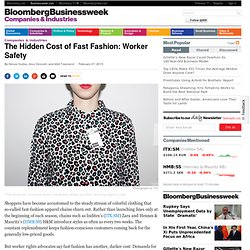
Rather than launching lines only at the beginning of each season, chains such as Inditex’s (ITX:SM) Zara and Hennes & Mauritz’s (HMB:SS) H&M introduce styles as often as every two weeks. The constant replenishment keeps fashion-conscious customers coming back for the generally low-priced goods. But worker rights advocates say fast fashion has another, darker cost: Demands for constant product turns may be putting workers’ lives at risk in developing nations such as Bangladesh, which suffered two fatal garment factory fires in as many months. Apparel sold by Spain’s Inditex, the world’s largest apparel company and a pioneer of faster fashion cycles, was found at a factory that caught fire on Jan. 26, killing at least seven people. Photograph by G.M.B. Surging wages and inflation in China have prompted global retailers to shift production to Bangladesh. 2014 Outlook: Zara's Fashion Supply-Chain Edge. Arteixo is a small town in northwestern Spain near the Atlantic, surrounded by fishing villages.
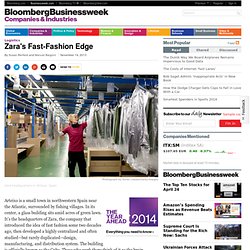
In its center, a glass building sits amid acres of green lawn. It’s the headquarters of Zara, the company that introduced the idea of fast fashion some two decades ago, then developed a highly centralized and often studied—but rarely duplicated—design, manufacturing, and distribution system. The building is officially known as the Cube. Those who work there think of it as the brain. The Cube is central command for a fashion empire built on an unconventional idea: speed and responsiveness are more important than cost. Levi Strauss seeks to slow down fast fashion with sustainable practices. Sixteen years of work as a fashion designer in New York was enough for Paul Dillinger.
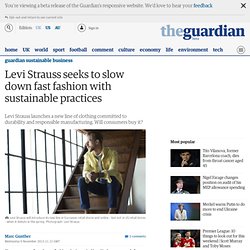
He quit and took a job teaching design at his alma mater, Washington University in St Louis. "I had become somewhat disillusioned – really challenged morally or ethically – by the industry," he says. Then a friend recruited Dillinger to work for Levi Strauss & Co Today, he's leading a cutting-edge initiative to take sustainable design to new heights at the 160-year-old company: a Dockers line of clothes called Wellthread. The line brings together the best practices in materials sourcing and garment manufacturing, providing social and economic benefits to factory workers in Bangladesh and delivering durable khakis, jackets and T-shirts to consumers.
Dillinger wants to weave responsibility into every stage of design, manufacturing and usage, from the cotton fields to the factories to the market and beyond. The True Cost of Fast Fashion. (3BL Media and Just Means)- In the middle of a conversation with film director Andrew Morgan, you suddenly find yourself standing on your feet, completely ready to radically change your lifestyle and consider the consequences of your consumption choices.
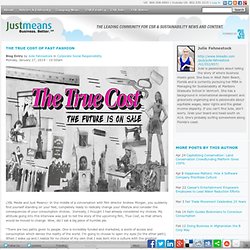
Ironically, I thought I had already considered my choices. My attitude going into this interview was just to tell the story of the upcoming film, True Cost, so that others would be moved to change. Wow, did I eat a big piece of humble pie.